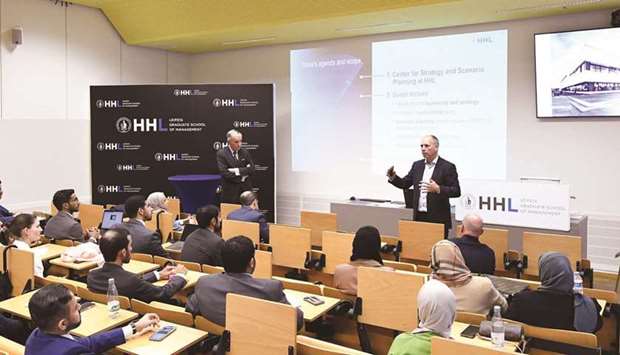Participants in Qatar Leadership Centre’s (QLC) Rising Leaders Programme, Class of 2021, recently completed their academic module 'New Challenges and German Answers' in an educational trip to Berlin, Germany.
This was the second in a series of trips this year organised by QLC for participants enrolled in its National Leadership Programme.
The Berlin trip agenda included a series of field visits, meetings, and workshops that provided real-world perspectives with practical insights in several fields, such as culture, economics, entrepreneurship, finance, industry, politics, and sports. The module was designed to bolster their leadership and executive skills in the face of emerging challenges.
“The QLC Rising Leaders Programme selects upcoming young Qatari leaders, and this trip was designed to guide their vision for their personal and professional futures while helping them supplement their leadership skills through a unique experience,” said general manager Dr Ahmed A al-Kuwari.
Nasreen Mohammed al-Malek, acting director of Programmes at QLC said: "We were keen to give our Rising Leaders a closer look at some of the best practices developed in Europe. Given Germany's leading position in that region in multiple fields, including the academic, economic, financial, and industrial sectors, this visit generated invaluable leadership insights for our participants, as well as rich cultural experience and a look into leadership creativity in various disciplines.”
The participants attended discussions and workshops on critical topics like strategy development and scenario planning at major German academic institutions, such as the European College of Management and Technology (ESMT) and the Leipzig Graduate School of Management.
Senior economic and political figures also met with the participants, including Johannes Pockrandt, director and co-head of Government and Regulatory Advocacy of Deutsche Bank, and Omid Nouripour, a member of the German Bundestag and its Committee for Foreign Affairs.
In addition, they explored prominent issues in the economy with several leading German companies. They held special sessions with top German industrial giants like Volkswagen AG, Aurubis, and Marcus Höfl Management GmbH, that focused on sustainable mobility, youth and women’s empowerment, and the future of sports management in the country respectively.
The group also got a closer look at the organisational cultures forged in major organisations in the country. They toured the German Bundestag’s parliament building in Berlin, where they gained an appreciation of its history, as well as Porsche Leipzig factory and facilities, where they witnessed the historic sports car manufacturer’s prototyping process and the development of their electric car programme.
They also examined the importance of sports and culture in Germany, as the participants attended a panel discussion of Germany's hosting of the 2006 FIFA World Cup and visited the Museum of Islamic Art in Germany, which contains one of the most important collections of Islamic archaeological artifacts in the world.
The Berlin trip agenda included a series of field visits, meetings, and workshops that provided real-world perspectives with practical insights in several fields, such as culture, economics, entrepreneurship, finance, industry, politics, and sports. The module was designed to bolster their leadership and executive skills in the face of emerging challenges.
“The QLC Rising Leaders Programme selects upcoming young Qatari leaders, and this trip was designed to guide their vision for their personal and professional futures while helping them supplement their leadership skills through a unique experience,” said general manager Dr Ahmed A al-Kuwari.
Nasreen Mohammed al-Malek, acting director of Programmes at QLC said: "We were keen to give our Rising Leaders a closer look at some of the best practices developed in Europe. Given Germany's leading position in that region in multiple fields, including the academic, economic, financial, and industrial sectors, this visit generated invaluable leadership insights for our participants, as well as rich cultural experience and a look into leadership creativity in various disciplines.”
The participants attended discussions and workshops on critical topics like strategy development and scenario planning at major German academic institutions, such as the European College of Management and Technology (ESMT) and the Leipzig Graduate School of Management.
Senior economic and political figures also met with the participants, including Johannes Pockrandt, director and co-head of Government and Regulatory Advocacy of Deutsche Bank, and Omid Nouripour, a member of the German Bundestag and its Committee for Foreign Affairs.
In addition, they explored prominent issues in the economy with several leading German companies. They held special sessions with top German industrial giants like Volkswagen AG, Aurubis, and Marcus Höfl Management GmbH, that focused on sustainable mobility, youth and women’s empowerment, and the future of sports management in the country respectively.
The group also got a closer look at the organisational cultures forged in major organisations in the country. They toured the German Bundestag’s parliament building in Berlin, where they gained an appreciation of its history, as well as Porsche Leipzig factory and facilities, where they witnessed the historic sports car manufacturer’s prototyping process and the development of their electric car programme.
They also examined the importance of sports and culture in Germany, as the participants attended a panel discussion of Germany's hosting of the 2006 FIFA World Cup and visited the Museum of Islamic Art in Germany, which contains one of the most important collections of Islamic archaeological artifacts in the world.

